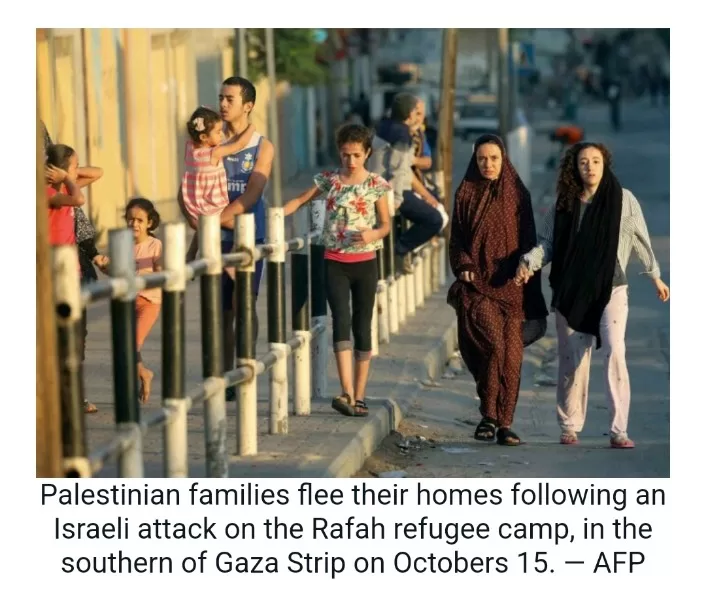Egypt, in a strategic move to safeguard its border with Gaza, is intensifying its military deployment at the Rafah border crossing due to mounting concerns that Israel may attempt to displace hundreds of thousands of Palestinian refugees into the desolate Sinai desert.
The Egyptian government has staunchly asserted that such a mass expulsion would not only constitute a flagrant violation of international law but also pose a grave national security risk, possibly jeopardizing the already fragile Egyptian economy. Additionally, there is a palpable apprehension that these displaced Palestinians may never be allowed to return to their homes.
Despite Israeli diplomats’ denial of any intention to forcibly expel Palestinians from Gaza while combating Hamas, Defense Minister Yoav Gallant has ominously articulated a plan to “eliminate everything.” Another Israeli minister, Gideon Sa’ar, has contended that Gaza “must be smaller at the end of the war.”
Danny Ayalon, a former Israeli ambassador to the United States, has proposed temporary relocation of Palestinians to the expansive Sinai desert, which lies just across Gaza. However, the broader international community remains wary of such suggestions.
US Secretary of State Antony Blinken engaged in discussions about Israel’s potential expulsion of Palestinians with Saudi Crown Prince Mohammed bin Salman, in the midst of his intensive diplomatic shuttle mission. Arab nations uniformly oppose this move and warn of the likelihood of sparking a regional conflict. However, they may reluctantly consider supporting the establishment of refugee camps if such expulsions come to pass, as most Palestinians in Gaza already have ancestral ties to those expelled in 1948. The fear looms that another mass expulsion could obliterate the hopes for a Palestinian state.
Egypt’s President, Abdel Fatah al-Sisi, has unequivocally declared that Palestinians in Gaza must “stay steadfast and remain on their land.”
The Turkish Foreign Minister, Hakan Fidan, has expressed full solidarity with Egypt, insisting on adherence to international law and unequivocally opposing the displacement of Palestinians. Egypt’s Foreign Minister, Sameh Shoukry, met with Germany’s counterpart, Annalena Baerbock, emphasizing that exit from Gaza, including for US citizens waiting at the Rafah gate, will be contingent on Israel permitting aid convoys into the territory, utilizing this as a bargaining chip.
While Egypt is actively seeking to avert a mass exodus from Gaza, it is concurrently making emergency preparations for this contingency. Egypt asserts that it envisions accommodating relatively small numbers of refugees and is opposed to large-scale refugee camps, fearing they may harbor elements opposing both President Sisi and Israel. It’s essential to note that Egypt is combating an insurgency in the Sinai Peninsula, adding complexity to the situation.
Egypt signed a peace treaty with Israel in 1979, marking the end of decades of conflict, and the two nations maintain full diplomatic relations. Nonetheless, the recognition of Palestinians in Egypt as either refugees or citizens is limited, with a smaller Palestinian population compared to other neighboring countries.
In a noteworthy indication of Egypt’s preparations for potential refugees, the governor of northern Sinai, Gen Mohamed Abdel-Fadil Shousha, recently lifted a long-standing state of emergency, urging local authorities to identify schools, housing units, and vacant land for use as shelters in the event of a Palestinian exodus. The camps are set to be established in Sheikh Zuweid and Rafah, with Egyptian military oversight.*
Egypt, Turkey, and the United Arab Emirates have collaborated to provide 143 trucks for a UN relief agency to support Palestinian refugees in Gaza (UNRWA). However, the main crossing remains closed, leaving the situation dire for the people of Gaza.
Secretary of State Blinken recently met with UAE officials, indicating a regional effort to address the crisis.
While the US Congress has previously withheld aid to Egypt due to human rights concerns under President Sisi, there will likely be mounting pressure to remove these restrictions if Egypt opens its doors to Palestinian refugees.
Tariq Al-Khouli, undersecretary of the foreign relations committee in the Egyptian parliament, pointed out the world’s inconsistency in addressing the Palestinian issue, emphasizing the potential displacement of Gaza’s population as a grave crime.
Jordan’s Foreign Minister, Ayman Safadi, unequivocally stated that Palestinians would not be permitted to seek refuge in Jordan, with King Abdullah II firmly setting the red line against forcing Palestinians from their homeland







